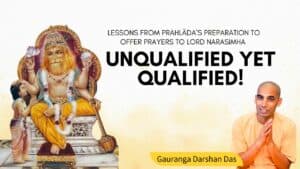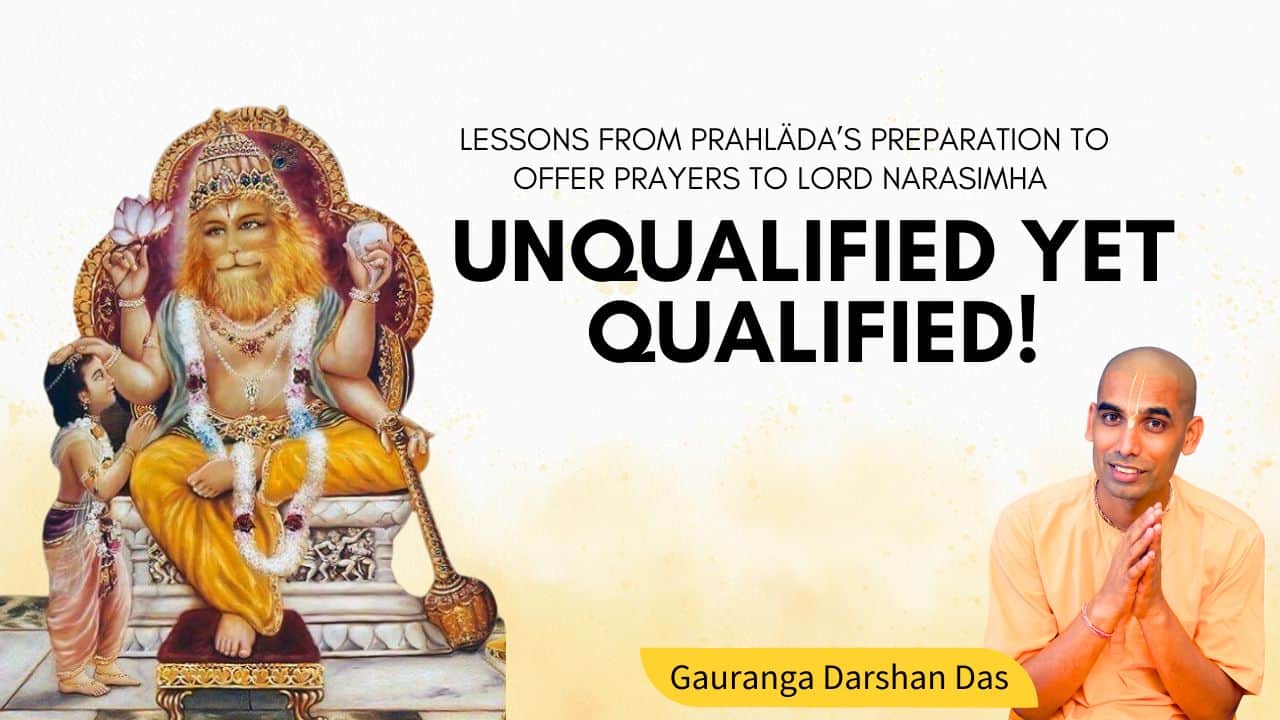
The pastime of little Prahlāda and Lord Nṛsiṁha from the Śrīmad-Bhāgavatam illustrates the triumph of devotion over evil, and the unwavering faith and humility of a young devotee.
When the tyrannic demon king Hiraṇyakaśipu challenged five-year-old Prahlāda about the existence of God, Prahlāda declared, “My Lord is omnipresent.” To prove His little devotee’s words true, the Supreme Lord appeared as a half-man half-lion incarnation. The Lord then vanquished the demon and saved His devotee but Lord’s anger remained unabated. His rage puzzled the devatās and sages who witnessed the spectacle. Despite their sincere efforts, Nṛsiṁha’s fury did not subside.
Even Lakṣmīdevī, Lord Nṛsiṁha’s consort, was reluctant to approach him. She admitted her fear, noting that she had never seen her Lord in such an intense state of anger. Amidst the fear and confusion, Lord Brahmā approached young Prahlāda to pacify the Lord with his prayers. Prahlāda humbly proceeded to offer his prayers.
The following is an analysis of his first five slokas that Prahlāda spoke in front of the Lord, while preparing himself to offer his prayers.
śrī-prahrāda uvāca
brahmadayah sura-gana munayo ’tha siddhah
sattvaikatana-gatayo vacasam pravahaih
naradhitum puru-gunair adhunapi pipruh
kim tostum arhati sa me harir ugra-jateh
Prahlāda Mahārāja prayed: How is it possible for me, who have been born in a family of asuras, to offer suitable prayers to satisfy the Supreme Personality of Godhead? Even until now, all the demigods, headed by Lord Brahmā, and all the saintly persons, could not satisfy the Lord by streams of excellent words, although such persons are very qualified, being in the mode of goodness. Then what is to be said of me? I am not at all qualified.
The devatās, headed by Brahmā, the munis, and the Siddhas in the assembly were in goodness (sattva). If they couldn’t satisfy the Lord, how could someone born in a family of demons (ugra jāti), who are constantly in passion (rajas) and ignorance (tamas), satisfy the Lord? Furthermore, they praised the Lord with streams of words that were fresh, cool, sweet, and pure, embellished with ornaments and literary suggestions (vacasam pravahaih), yet they couldn’t satisfy the Lord. Then how could Prahlāda, who lacked such eloquence, satisfy the Lord? Prahlāda showed no pride in receiving the privileged opportunity to appease the Lord; rather, he humbly declared his incapability to do so, despite being capable.
Śrīla Prabhupada writes in the purport, “A Vaiṣṇava who is fully qualified to serve the Lord still thinks himself extremely low while offering prayers to the Lord. For example, Kṛṣṇadāsa Kāvirāja Gosvāmī considers himself unqualified, lower than the worms in stool, and more sinful than Jagāi and Mādhāi. Similarly, although Prahlāda Mahārāja was a pure, exalted Vaiṣṇava, he thought himself most unqualified to offer prayers to the Supreme Lord. mahājano yena gataḥ sa panthāḥ [Cc. Madhya 17.186]. One should not be falsely proud of his Vaiṣṇava qualifications. Unless one is meek and humble, to make progress in spiritual life is very difficult.”
Sometimes, when we are considered capable of doing something that many others have failed to accomplish, we can become overpowered with pride. What to speak of actually accomplishing it! Such a proposal or accomplishment might make us think of ourselves as better than others. In contrast to this mentality, Prahlāda, right at the outset, declared his inferior position compared to Brahma and others in the assembly who had failed to appease Nṛsiṁhadeva.
In this sloka, Prahlāda also indicated that goodness and eloquence are not the necessary qualifications to invoke the Lord’s mercy. Then what is the qualification? Prahlāda mentions that in the next verse.
“THE ONLY QUALIFICATION TO PLEASE YOU!”
manye dhanabhijana-rupa-tapah-srutaujas-
tejah-prabhava-bala-paurusa-buddhi-yogah
naradhanaya hi bhavanti parasya pumso
bhaktya tutosa bhagavan gaja-yutha-paya
Prahlada Maharaja continued: One may possess wealth, an aristocratic family, beauty, austerity, education, sensory expertise, luster, influence, physical strength, diligence, intelligence and mystic yogic power, but I think that even by all these qualifications one cannot satisfy the Supreme Personality of Godhead. However, one can satisfy the Lord simply by devotional service. Gajendra did this, and thus the Lord was satisfied with him.
The one dozen qualifications mentioned above are considered great in material calculation. Although such skills and the opulences impress the people of the world, but they aren’t attractive to the Lord. Only bhakti or unalloyed devotion can satisfy the Him. Duryodhana, with his opulent feast couldn’t please Kṛṣṇa, but Vidura completely satisfied the Lord even with a banana peel. Sincerity of purpose is more important than skill set.
Prahlāda was just a five-year-old boy, son of an atheistic father and was born in a demoniac dynasty. But none of these were considered disqualifications for him to satisfy the Lord. He never rejects someone on the grounds of their age, gender, wealth, nationality, education, family lineage, and so on. All He wants is sincere devotion.
“DO I HAVE THE QUALIFICATION?”
Continuing the same point that bhakti is the only qualification to please the Lord, Prahlāda speaks the next sloka:
viprad dvi-sad-guna-yutad aravinda-nabha-
padaravinda-vimukhat svapacam varistham
manye tad-arpita-mano-vacanehitartha-
pranam punati sa kulam na tu bhurimanah
If a brahmana has all twelve of the brahminical qualifications [as they are stated in the book called Sanat-sujata] but is not a devotee and is averse to the lotus feet of the Lord, he is certainly lower than a devotee who is a dog-eater but who has dedicated everything — mind, words, activities, wealth and life — to the Supreme Lord. Such a devotee is better than such a brahmana because the devotee can purify his whole family, whereas the so-called brahmana in a position of false prestige cannot purify even himself.
“ALTHOUGH UNQUALIFIED, I WILL BE BENEFITED”.
naivatmanah prabhur ayam nija-labha-purno
manam janad avidusah karuno vrnite
yad yaj jano bhagavate vidadhita manam
tac catmane prati-mukhasya yatha mukha-srih
The Supreme Lord, the Supreme Personality of Godhead, is always fully satisfied in Himself. Therefore when something is offered to Him, the offering, by the Lord’s mercy, is for the benefit of the devotee, for the Lord does not need service from anyone. To give an example, if one’s face is decorated, the reflection of one’s face in a mirror is also seen to be decorated.
Śrīla Prabhupāda comments: “The Lord is always glorious, whether the devotee glorifies Him or not, but if the devotee engages in glorifying the Lord, the devotee himself automatically becomes glorious… By glorifying the Lord constantly, the living entity becomes purified in the core of his heart, and thus he can understand that he does not belong to the material world but is a spirit soul whose actual activity is to advance in Kṛṣṇa consciousness so that he may become free from the material clutches… In conclusion, the more we engage in Kṛṣṇa consciousness and render service unto the Lord, the more we benefit. Kṛṣṇa does not need service from any of us.”
When we overly think of our shortcomings, and incapabilities it can be discouraging. However, rising above these shortcomings is possible by offering prayers and sincerely serving the Lord and His devotees. The process of bhakti can elevate even the most unqualified or even degraded people despite their deficiencies. So, instead of being overwhelmed with our weaknesses, we should strive to rise above them by engaging our bodies, minds, senses and intelligence is serving and glorifying the Lord. In this mood Prahläda speaks the next shloka.
“YOUR MERCY IS GREATER THAN MY DISQUALIFICATION”
tasmad aham vigata-viklava isvarasya
sarvatmana mahi grnami yatha manisam
nico ’jaya guna-visargam anupravistah
puyeta yena hi puman anuvarnitena
Therefore, although I was born in a demoniac family, I may without a doubt offer prayers to the Lord with full endeavor, as far as my intelligence allows. Anyone who has been forced by ignorance to enter the material world may be purified of material life if he offers prayers to the Lord and hears the Lord’s glories.
The solution to all material shortcomings is sincere performance of bhakti. In the conception of being unqualified, if we restrain ourselves from engaging in bhakti, where is the possibility to overcome those deficiencies. If a patient says, “I am not taking medicine because I am sick,” does it sound reasonable to you? – Because one is sick, one must take medicine. Similarly, one who is affected by māyā, must come out of it by sincerely taking shelter of the Lord.
One can do bhakti as per one’s capacity. Prahlāda said that he would offer prayers as far as his intelligence allows him – yathā manīṣam. The Lord is not performance conscious, He is mood conscious. He sees the attitude behind our service more than the magnitude of service. Skills and efficiency are required for a specific service, but if that becomes a source of our pride, it is the greatest disadvantage. Better to be an illiterate menial servant that a scholarly puffed-up performer.
HUMILITY – THE REAL ORNAMENT OF A DEVOTEE
Prahläda Maharaja initially felt himself unqualified to offer prayers, yet finally, he kept aside those feelings and prepared himself to offer prayers, expressing his confidence on the mercy of the Lord and his guru. In both cases he exhibited exemplary humility.
Prahläda recognized his limitations, both intellectual and spiritual. He admitted his shortcomings openly, expressing that he was not qualified by certain standards to offer prayers to the Lord. That was his humility. However, he resolved to set aside these feelings of inadequacy, driven by his humble devotion. He humbly prepared himself to offer prayers to the Lord by the blessings of his guru, and the Lord.
Prahlad’s example serves as an encouragement for all devotees. He demonstrated that one should not be discouraged by perceived disqualifications or shortcomings. The mercy of the Lord is greater than any disqualification, and sincere devotion can bridge any gap. Prahlad’s humility and recognition of his dependence on the Lord are key takeaways. His prayers reflect a deep understanding of the devotee’s role in relation to the divine, emphasizing the importance of humility and reliance on the Lord’s grace.


